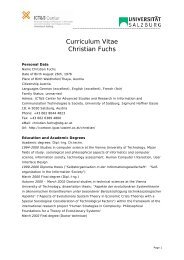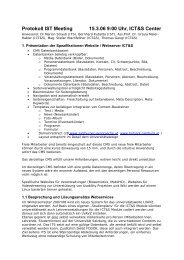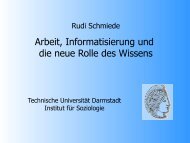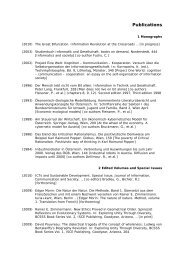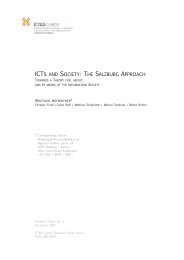CHRISTIAN FUCHS - ICT&S - Universität Salzburg
CHRISTIAN FUCHS - ICT&S - Universität Salzburg
CHRISTIAN FUCHS - ICT&S - Universität Salzburg
Create successful ePaper yourself
Turn your PDF publications into a flip-book with our unique Google optimized e-Paper software.
Christian Fuchs: Social Networking Sites and the Surveillance SocietyTable 12 shows bivariate correlations between the surveillance critique index and otherfactors. The result is that the surveillance critique index is significantly (at the 0.01level) negatively correlated to female gender (positively to male gender), studyingnatural sciences, and the usage frequency of ISNS. It is significantly (at the 0.01 level)positively correlated to the number of semesters studied, studying social sciences, andincome. Being female decreases the probability of being critical of surveillance,whereas being male increases it. A reason for this influence could be patriarchalsocietal structures that construct women as being irrational and incapable of using andunderstanding technology. It can be an outcome of these structures that women showless interest in technology and the influence of technology on society than men.Surveillance is a topic that is strongly connected to data collection and electronic dataprocessing. Studying natural sciences decreases the likelihood of being critical ofsurveillance, whereas studying social sciences increases this likelihood. Naturalscientists tend to learn positivistic research methods and are interested in nature,whereas social scientists also employ more qualitative methods and are more frequentlyconfronted with critical theories and critical research in their studies than naturalscientists. Positivism is only interested in how something is, whereas critical thinking isinterested in suppressed potentials and in what something could become and how itcan be improved. Positivism is instrumental, whereas criticism is non-instrumental(Horkheimer 1947/1995).“Modern science, as positivists understand it, refers essentially to statements aboutfacts, and therefore presupposes the reification of life in general and of perceptionin particular. It looks upon the world as a world of facts and things, and fails toconnect the transformation of the world into facts and things with the socialprocess. The very concept of ‘fact’ is a product – a product of social alienation; init, the abstract object of exchange is conceived as a model for all objects ofexperience in the given category. The task of critical reflection is not merely tounderstand the various facts in their historical development – and even this hasimmeasurably wider implications than positivist scholasticism has ever dreamedof – but also to see through the notion of fact itself, in its development andtherefore in its relativity. The so-called facts that the positivists are inclined toregard as the only scientific ones, are often surface phenomena that obscurerather than disclose the underlying reality” (Horkheimer 1974/2004: 56).Students who use ISNS frequently are more likely to be rather uncritical of surveillance.Surveillance is invisible. Foucault as a central characteristic of disciplinary surveillancepower already characterized the principle of “seeing without being seen”.“The Panopticon is a machine for dissociating the see/being seen dyad: in theperipheric ring, one is totally seen, without ever seeing; in the central tower, onesees everything without ever being seen” (Foucault 1977: 201f).If one uses information and communication technologies frequently and does not seeany immediate evidence of being under surveillance, then one might become moretrusting in online platforms in particular and in the harmlessness of surveillance ingeneral. Surveillance is a phenomenon that tries to naturalize and normalize itself, i.e.students, who have studied an upper number of semesters, are more likely to be criticalof surveillance than other students. Graduate and doctoral students are more educated64



